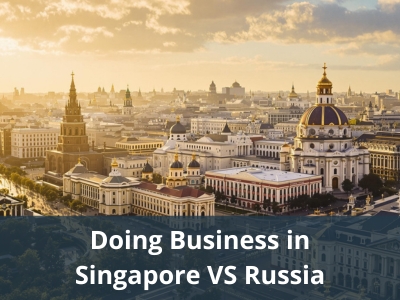Doing Business in Singapore VS Russia – A Comparison
 Entrepreneurs and investors often face a dilemma when choosing the ideal destination to establish or expand their businesses. Both Singapore and Russia offer unique advantages, making the decision particularly challenging. Singapore is renowned for its competitive business landscape, high quality of life, and cost-effective setup for smaller businesses, while Russia boasts a vast domestic market and abundant natural resources that appeal to certain industries.
Entrepreneurs and investors often face a dilemma when choosing the ideal destination to establish or expand their businesses. Both Singapore and Russia offer unique advantages, making the decision particularly challenging. Singapore is renowned for its competitive business landscape, high quality of life, and cost-effective setup for smaller businesses, while Russia boasts a vast domestic market and abundant natural resources that appeal to certain industries.
This article delves into the key factors that differentiate these two business hubs, helping you make an informed decision.
Key Comparison Points
Business Environment
- Singapore: Singapore offers a politically stable environment, a robust legal framework, and proactive government support, making it a global hub for business and innovation.
- Russia: Russia provides access to a large domestic market, but its political and legal environment can pose challenges for foreign investors.
Taxation
- Singapore: Singapore’s corporate tax rate is 17%, with various tax incentives and no capital gains tax, making it highly attractive for businesses.
- Russia: Russia has a corporate tax rate of 20% and does impose capital gains tax, though it offers tax benefits for specific industries like technology and manufacturing.
Ease of Company Incorporation
- Singapore: Singapore boasts a seamless incorporation process, supported by advanced digital infrastructure and a transparent regulatory environment.
- Russia: Setting up a business in Russia can be more complex, with bureaucratic hurdles and less streamlined processes compared to Singapore.
Cost of Living and Business Operations
- Singapore: While living costs are high, operational costs like office rentals and utilities are competitive for smaller businesses.
- Russia: Russia offers lower living and operational costs, but businesses may face additional costs related to navigating local regulations.
Access to Markets
- Singapore: Singapore’s strategic location, excellent global connectivity, and numerous trade agreements make it a gateway to Asia and beyond.
- Russia: Russia provides access to a vast domestic market and serves as a bridge between Europe and Asia, though its global trade agreements are more limited.
Quick Comparison Overview
Here’s a quick overview of the key differences for easy reference:
| Factor |
Singapore |
Russia |
| Business Environment |
Politically stable, strong legal framework, government support |
Large domestic market, but political and legal challenges |
| Corporate Tax Rate |
17% |
20% |
| Capital Gains Tax |
None |
Applicable |
| Ease of Incorporation |
Efficient and digitalized process |
More complex with bureaucratic hurdles |
| Business Costs |
Competitive for smaller businesses |
Lower overall costs but regulatory challenges |
| Market Access |
Excellent global connectivity and trade agreements |
Access to domestic market and Eurasian region |

Benefits of Choosing 3E Accounting
Whether you’re looking to register a company in Singapore or start a business in Singapore, 3E Accounting offers unparalleled expertise and support. From seamless incorporation to comprehensive business solutions, our team ensures a hassle-free experience for entrepreneurs and investors.
Explore our Singapore company incorporation services package to understand how we can assist you. For more guidance, check out our guide to register a company in Singapore. Ready to take the next step? 3E Accounting is here to help. Contact us today to get started.
Ready to Expand into Singapore? Choose 3E Accounting Today!
Stay Secure, Stay Successful With 3E Accounting Services
Contact Us Now
Frequently Asked Questions
The company registration process in Singapore is more efficient and digitalized compared to Russia, where bureaucratic hurdles can slow down the process.
3E Accounting is a leading corporate services provider in Singapore, offering expertise and comprehensive business solutions.
Abigail Yu oversees executive leadership at 3E Accounting Group, leading operations, IT solutions, public relations, and digital marketing to drive business success. She holds an honors degree in Communication and New Media from the National University of Singapore and is highly skilled in crisis management, financial communication, and corporate communications.



 Entrepreneurs and investors often face a dilemma when choosing the ideal destination to establish or expand their businesses. Both Singapore and Russia offer unique advantages, making the decision particularly challenging. Singapore is renowned for its competitive business landscape, high quality of life, and cost-effective setup for smaller businesses, while
Entrepreneurs and investors often face a dilemma when choosing the ideal destination to establish or expand their businesses. Both Singapore and Russia offer unique advantages, making the decision particularly challenging. Singapore is renowned for its competitive business landscape, high quality of life, and cost-effective setup for smaller businesses, while 